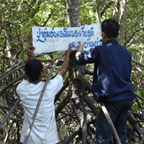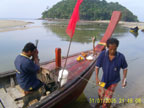About Us
 Coastal resources in Thailand are undergoing massive destruction and are being utilized
in a highly unsustainable manner. Fisheries resources are being exploited to supply local and
global markets alike without regard to long term sustainability or environmental destruction.
Seagrass and coral reefs are being destroyed by these destructive fishing methods. Mangrove
forests are likewise being depleted at an alarming rate due to encroachment for development
projects and shrimp farming which is being unconditionally promoted to supply lucrative export
markets. Corruption and already lax law enforcement are further fueled by Thailand’s status as
the number one exporter world of marine products. The destruction of coastal resources has
direct effects on local communities who depend on these resources for day to day survival.
Direct dependence on natural resources and allow educational level compounds existing
problems and creates further problems for these poor communities. Coastal resources in Thailand are undergoing massive destruction and are being utilized
in a highly unsustainable manner. Fisheries resources are being exploited to supply local and
global markets alike without regard to long term sustainability or environmental destruction.
Seagrass and coral reefs are being destroyed by these destructive fishing methods. Mangrove
forests are likewise being depleted at an alarming rate due to encroachment for development
projects and shrimp farming which is being unconditionally promoted to supply lucrative export
markets. Corruption and already lax law enforcement are further fueled by Thailand’s status as
the number one exporter world of marine products. The destruction of coastal resources has
direct effects on local communities who depend on these resources for day to day survival.
Direct dependence on natural resources and allow educational level compounds existing
problems and creates further problems for these poor communities.
Participatory management of natural resources is seen as a means to alleviate further
deterioration of the situation of both the natural resources and the local communities.
Furthermore, it will help to add “clarity” to the activities of government in light of a deeply rooted
patronage system and rampant corruption. A new constitution upholding the rights of local
communities to participate in the anagement of natural resources and political reform in the
wake of the Asian economic crisis indicate the atmosphere is ripe to “scale up” activities through
more serious educational and policy advocacy campaigning at the national level. of the situation of both the natural resources and the local communities.
Furthermore, it will help to add “clarity” to the activities of government in light of a deeply rooted
patronage system and rampant corruption. A new constitution upholding the rights of local
communities to participate in the anagement of natural resources and political reform in the
wake of the Asian economic crisis indicate the atmosphere is ripe to “scale up” activities through
more serious educational and policy advocacy campaigning at the national level.
Since 1991, Wildlife Fund Thailand has funded efforts to conserve coastal wetlands and coastal natural resources in southern Thailand. Efforts have evolved: first were surveys and publications
on coastal resources; next were campaigns to save, conserve, and sustainably manage coastal
resources and endangered species; followed by work with local communities for participatory
management for long term sustainability of coastal ecosystems. The most recent phase now
includes campaigning for better law enforcement and new and/or revised government policies
towards coastal wetland resources.
 Substantial gains have occurred but considerable more work is required to ensure the
continuation of past progress and gains. The situation in the field with regard to human resources
working on related issues is completely different from the period in which the project was first
conceived and the period in which emphasis shifted to working toward local involvement through
organizational and networking activities. Differences in available manpower and funding, different
political and economic situations, a review of Wildlife Fund Thailand’s project team past efforts,
and other factors was undertaken in preparation to draft a proposal for further intervention. Substantial gains have occurred but considerable more work is required to ensure the
continuation of past progress and gains. The situation in the field with regard to human resources
working on related issues is completely different from the period in which the project was first
conceived and the period in which emphasis shifted to working toward local involvement through
organizational and networking activities. Differences in available manpower and funding, different
political and economic situations, a review of Wildlife Fund Thailand’s project team past efforts,
and other factors was undertaken in preparation to draft a proposal for further intervention.
A participatory planning effort was undertaken to further review the present situation and
evaluate the best direction for future work in light of the many new parameters and lessons
learned from past efforts. The results of these workshops and project staff analysis are reflected
in this proposal. Major components of the project include:
- media campaign to educate the general public and government officials
- campaign to advocate improved policies and laws
- demonstration site activities on participatory management of coastal resources
- networking, coordination and cooperation with partner organizations
- training of local NGO and community organization partners.
|

